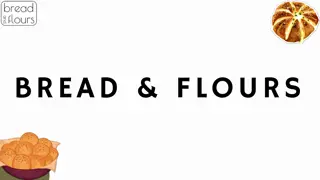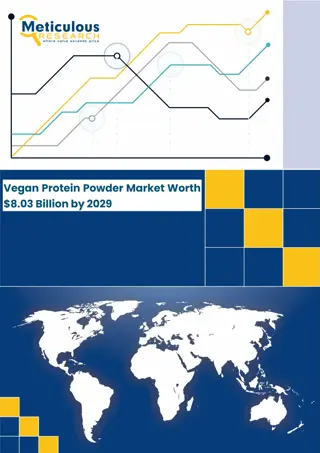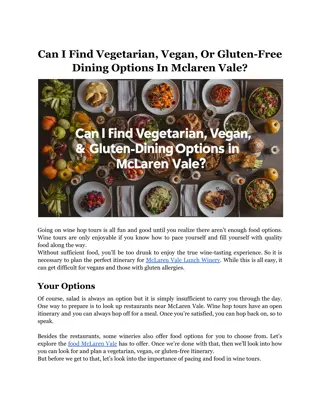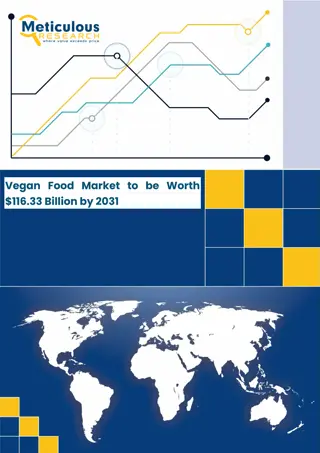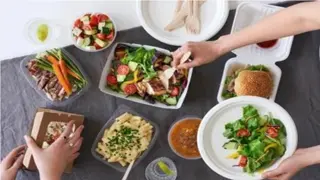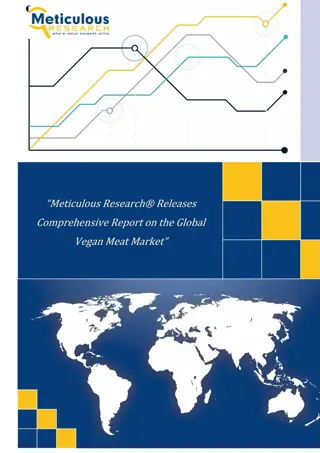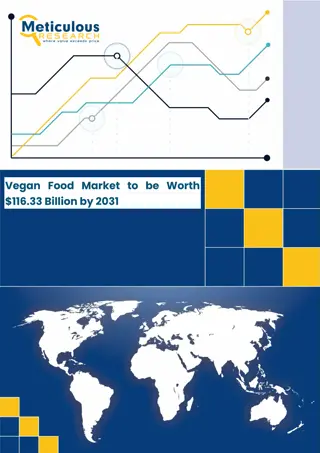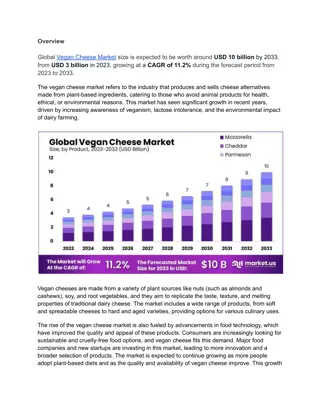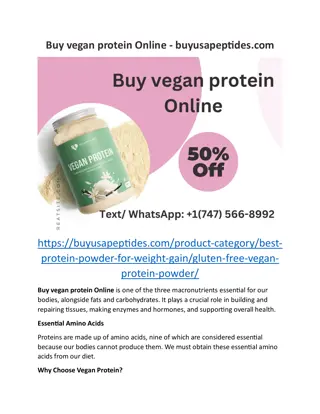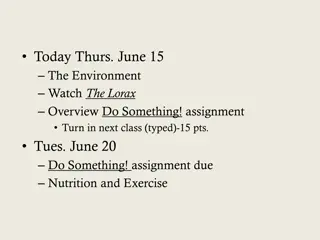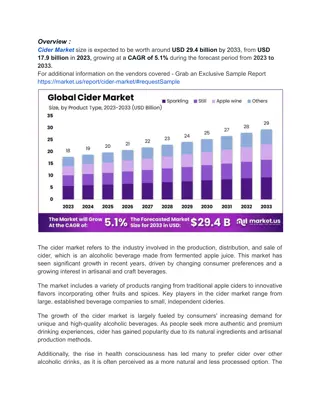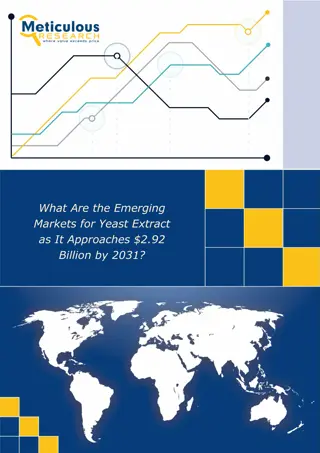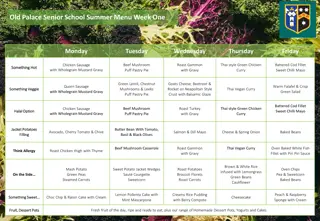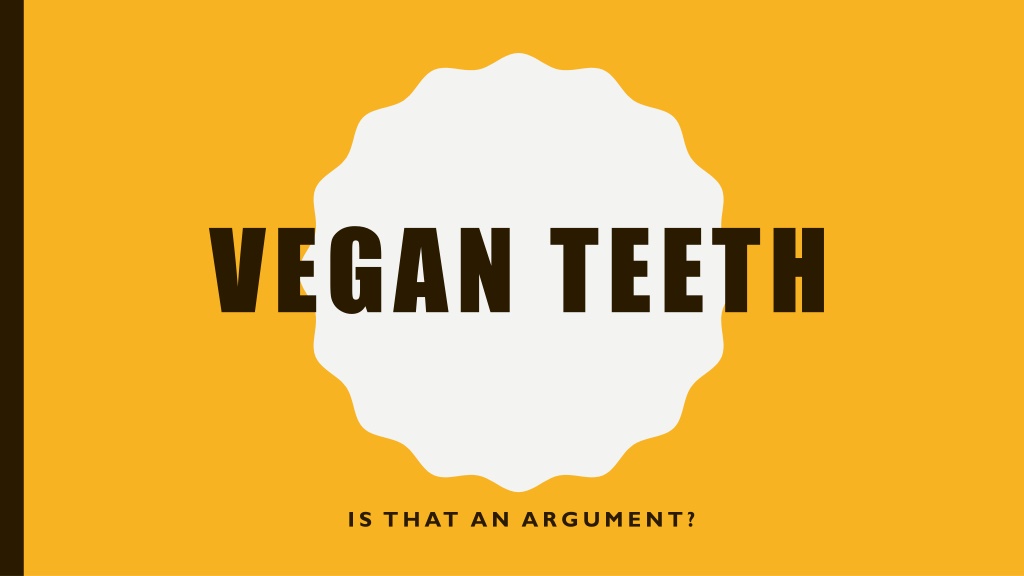
Debunking Myths About Veganism: Examining the Role of Meat in Diets
This content challenges common misconceptions surrounding veganism and the historical consumption of meat. It discusses the arguments related to vegan teeth, personal opinions, language usage, double negatives, clichés, religious beliefs, and the historical context of meat consumption. The content emphasizes critical thinking and the need to separate facts from myths in dietary discussions.
Download Presentation

Please find below an Image/Link to download the presentation.
The content on the website is provided AS IS for your information and personal use only. It may not be sold, licensed, or shared on other websites without obtaining consent from the author. Download presentation by click this link. If you encounter any issues during the download, it is possible that the publisher has removed the file from their server.
E N D
Presentation Transcript
VEGAN TEETH IS THAT AN ARGUMENT?
NO INTRO Don t write an intro. This is not an English 101 class. Begin your paper with your argument and then defend it.
PERSONAL OPINION/TASTE Keep your personal opinion to yourself. If back in your country they do X, good for them. But it does not mean that X is morally justified. Moral judgment should not be based on personal taste.
AVOID NONSTANDARD ENGLISH Here are some examples: Based of/Based off of instead of Based on Could of instead of Could have People was instead of People were He jumped off of the wall here of is redundant. Real quick is a colloquial expression, meaning very quickly , which is the grammatically correct and more formal phrasing. Don t write can not it is one word: cannot
NO Double negatives: I can t get no satisfaction I wasn t looking for nobody. We don t need no education. I can't get no sleep. Got nothing to hide no more.
Quit Saying Honestly or to be honest or To Tell the Truth Are normally not honest?
NO CLICHS This is a college, not a chat room. Use formal language. Think outside the box Every cloud has a silver lining What goes around comes around Instead, state what you mean and explain.
RELIGION I quote: Christianity is the only generally accepted moral guide. What about Hinduism, Jainism, Taoism, Buddhism, Gnosticism, Zoroastrianism? They do not accept Christianity. Also non-religious people do not accept Christianity. Also, I quote: Role of humanity is anchored in Genesis, the first book that gives Christians the privilege to eat meat. If you are religious great! However, Your religious convictions are important to you! Your religious convictions are personal. Keep them to yourself.
MEAT HAS ALWAYS BEEN A BIG SOURCE IN EVERYONE S DIET FOR MANY YEARS Historically false. Meat was a food for the royalty. This has been demonstrated over and over again. Consumption of meat goes up as wealth grows. All you need to do is to take an introductory course in economics! Most importantly, in affluent societies, we do not eat meat to survive, but for pleasure.
ANIMALS EAT OTHER ANIMALS What is right for a lion may not be right for you. We do not derive morality from animals. Humans unfortunately not all have the capacity to reflect upon their actions.
BUT WHAT ABOUT THIS TRIBE AND THAT TRIBE? We have to focus on affluent societies.
WERE ON TOP OF THE FOOD CHAIN What does this exactly mean? Who established that? Assume this is true, just because we are, does it mean we have to eat animals? If you were told you are a terminator, would you kill Sara Connor?
OUR BODIES HAVE EVOLVED TO EAT MEAT? Our bodies are evolved to be evil. To go to war. To fight. So is it moral to do those things?
HUMAN BEINGS ARE CARNIVORES 2 words: (1)Prove (2)(2) it!
WELL, TO ME THE QUESTION OF EATING ANIMALS OR NOT IS NOT A MORAL QUESTION. Exactly, to you! Just do a quick google search and see how important this question is. The issue of industrially farmed animals has become one of the most pressing ethical questions of our time. (C. Alvaro)
EATING MEAT IS REQUIRED FOR GOOD HEALTH The World Health Organization International Agency for Research on Cancer concluded that consumption of meat causes cancer. The China Study concluded that people who eat meat run the risk of developing numerous diseases. A 2014 Harvard study concluded that one serving a day of red meat during adolescence was associated with a 22% higher risk of pre-menopausal breast cancer, and in adulthood 13%. Meat eaters are 3 times more likely to be obese than vegetarians, and 9 times more likely than vegans. According JAMA Internal Medicine, vegetarians may live longer than meat eaters, National Research Council:The U.S., where meat is consumed at more than three times the global average is one of the sickest nations in the world.
VEGANS ARE NOT HEALTHY Position of the American Dietetic Association: vegetarian diets. It is the position of the American Dietetic Association that appropriately planned vegetarian diets, including total vegetarian or vegan diets, are healthful, nutritionally adequate, and may provide health benefits in the prevention and treatment of certain diseases. Well-planned vegetarian diets are appropriate for individuals during all stages of the life cycle, including pregnancy, lactation, infancy, childhood, and adolescence, and for athletes. A vegetarian diet is defined as one that does not include meat (including fowl) or seafood, or products containing those foods. This article reviews the current data related to key nutrients for vegetarians including protein, n-3 fatty acids, iron, zinc, iodine, calcium, and vitamins D and B-12. A vegetarian diet can meet current recommendations for all of these nutrients.
IF WE ALL GO VEGAN THERE WILL BE TOO MANY ANIMALS AND WHAT ARE WE GOING TO EAT? The number of animals is high because humans bring them into existence artificially. According to research published by The American Journal of Clinical Nutrition, A meat-eater s diet requires 17 times more land, 14 times more water and 10 times more energy than a vegetarian s. This is principally because we use a large proportion of the world s land for growing crops to feed livestock, rather than humans. (Of the world s approximately five billion hectares of agricultural land, 68% is used for livestock.) In 50 years, the UN predicts there will be 10.5 billion people on the planet (currently around 7 billion). To 10 billion people, we will need to grow food more sustainably. Dr. Willett, professor of medicine at Harvard University says we could eliminate the worst cases of world hunger today with about 40 million tons of food yet 760 million tons is fed to animals on farms every year.
MEAT HAS PROTEINS What do cows, rhinoceroses, and elephants eat?
There are 9 essential amino acids: 1. Leucine.seaweed, pumpkin, peas, rice, sesame seeds, watercress, turnip greens, soy, sunflower seeds, kidney beans, figs, avocados, raisins, dates, apples, blueberries, olives, bananas. 2. Asoleucine.rye, soy, cashews, almonds, oats, lentils, beans, brown rice, cabbage, hemp seeds, chia seeds, spinach, pumpkin, sunflower seeds, sesame seeds, cranberries, quinoa, blueberries, apples, kiwis. 3. Lysine. beans (again), watercress, hemp seeds, chia seeds, spirulina, parsley, avocados, almonds, cashews, lentils, chickpeas.
4. Methionine. sunflower seeds, hemp seeds, chia seeds, Brazil nuts, oats, seaweed, pasta, figs, rice, beans, legumes, onions, raisins. 5. Phenylalanine. spirulina and other seaweed, pumpkin, beans, rice, avocado, almonds, peanuts, quinoa, figs, raisins, leafy greens, most berries, olives. 6. Threonine. watercress and spirulina (exceeding meat), pumpkin, leafy greens, hemp seeds, chia seeds, soybeans, sesame seeds, sunflower seeds, almonds, avocados, figs, raisins, quinoa, and wheat, sprouted grains.
7. Tryptopan. oats, seaweed, hemp seeds, chia seeds, spinach, watercress, soybeans, pumpkin, sweet potatoes, parsley, beans, beats, asparagus, mushrooms, lettuces, leafy greens, beans, avocado, figs, winter squash, celery, peppers, carrots, chickpeas, onions, apples, oranges, bananas, quinoa, lentils, peas. 8. Valine. beans, spinach, legumes, broccoli, sesame seeds, hemp seeds, chia seeds, soy, peanuts, whole grains, figs, avocado, apples, blueberries, cranberries, oranges, and apricots. 9. Histidine. rice, pasta, rye, seaweed, beans, legumes, cantaloupe, hemp seeds, chia seeds, buckwheat, potatoes, cauliflower, corn.
VEGETARIANS HAVE LOWER B12 Cows don t eat meat. Where do cows get B12 from? Why do they produce B12 supplements?
IN CONCLUSION Moral justification requires hard thinking and sound reasoning. Assertions do not prove anything. You must construct a careful moral argument. Your personal opinion is good; but keep it to youself! You are entitled to your own opinion but not to your own facts. Also very important: Academic discussions are not parlor games where one wins and another loses. We exchange ideas and arguments for the sake of understanding each others and advancing knowledge.

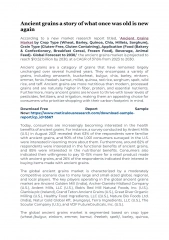
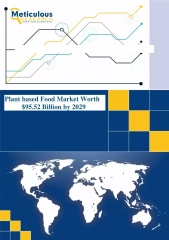

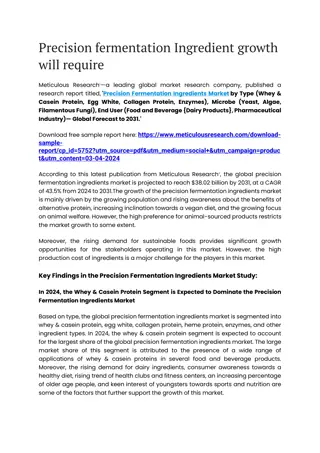
![GET [✔PDF✔] DOWNLOAD✔ My Vegan Recipe Notebook for all your recipes - 6x9 i](/thumb/68090/get-pdf-download-my-vegan-recipe-notebook-for-all-your-recipes-6x9-i.jpg)

